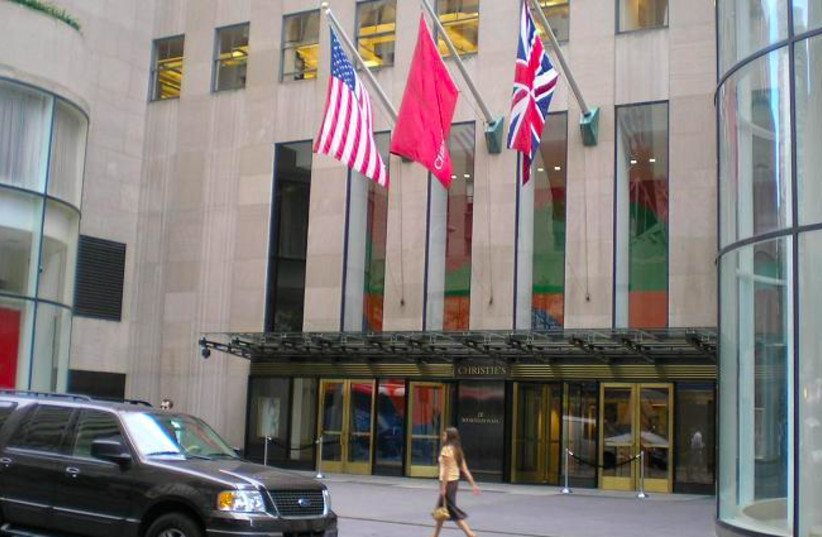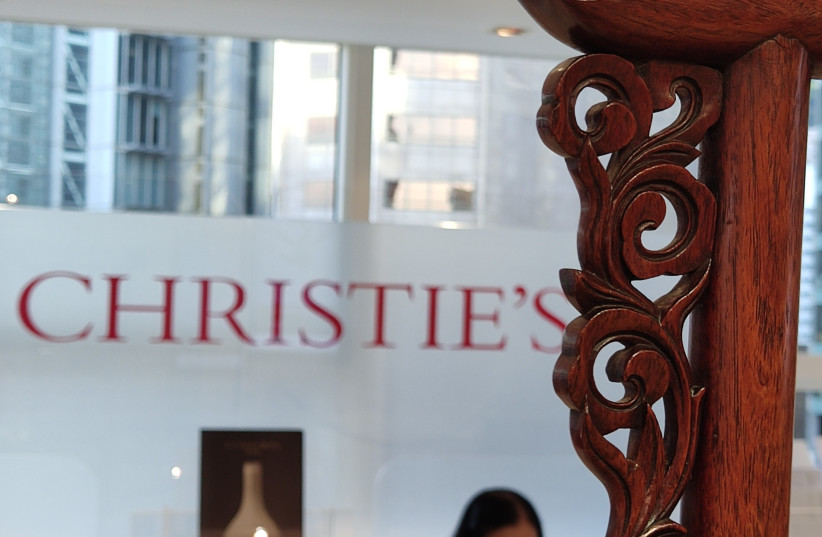For months, Christie’s auction house has faced blowback for a $202 million sale of a jewelry collection tied to Nazi plunder.
Now, a group of Holocaust survivors that has taken Christie’s to task for the sale is turning its attention to the relationship between the auction house, the Tel Aviv Museum of Art and a New York-based charity that funds the museum.
The Holocaust Survivors Foundation USA has called on the museum to cancel a conference focused on art restitution that it’s hosting in collaboration with Christie’s in December. On Friday, the organization sent a letter in protest to Tel Aviv Museum of Art American Friends, a fundraising body, saying the conference would provide “a platform within the Jewish State for Holocaust profiteers to justify their plunder and marginalize Holocaust survivors around the world.”
But the link between the Christie’s conference and the American Friends group may stretch beyond the millions of dollars the group funnels to the museum. One of the 10 people serving on the board of the American Friends organization, Marc Porter, is also a senior executive at Christie’s, serving as chairman of the company’s Americas division. He helped organize the auction house’s yearlong initiative celebrating the 25th anniversary of an international agreement on the restitution of Nazi-looted art, which will culminate with the Tel Aviv event.
The fact that Porter is involved in the museum’s fundraising apparatus and, at the same time, stands to receive credit professionally for an event hosted at the museum has raised eyebrows among critics.

The situation “creates a clear conflict of interest in relation to this deplorable event,” said David Schaecter, president of Holocaust Survivors Foundation USA, in a statement to the Jewish Telegraphic Agency.
After the story was published, Christie’s released a statement: “We reject the suggestion that there is any conflict of interest in Marc Porter’s role at Christie’s and his support of the American Friends of the Tel Aviv Museum of Art. Marc was not involved in the negotiations regarding the restitution program at the Tel Aviv museum.”
The pressure on the museum, combined with the complaint about Porter’s roles, is the latest fallout Christie’s has faced for auctioning the jewelry in May, which came from the estate of a family that profited from the dispossession of Jewish businesses during the Holocaust. Following backlash, the museum offered to donate some of its profits from the sale to support Holocaust research and education. But several institutions have rejected the money including, JTA has learned, the leading organization responsible for distributing Holocaust reparations.
“Our position, which we made clear to Christie’s, is that they should not profit from this sale — all fees and commission after expenses should go to the care of Holocaust survivors,” said Gideon Taylor, president of the Conference on Jewish Material Claims Against Germany, known as the Claims Conference.
He added, “Christie’s has not articulated to us why they wish to retain any part of the commission and fees. Without these steps, we believe that they will be choosing to be on the wrong side of history.”
The auction in question featured jewelry from the estate of late Austrian philanthropist Heidi Horten, who died last year. It was the largest jewelry sale in history, and the proceeds benefited the Heidi Horten Foundation, founded in 2021, which supports an eponymous art museum as well as children’s welfare and medical research.
The fortune behind the jewelry collection was partially built during the Nazi era by Heidi’s late husband Helmut, who dispossessed Jews of their businesses as a member of the Nazi party — a process called “Aryanization.” Many owners sold him their businesses at steep bargains under the threat of being sent to concentration camps.
The announcement of the auction triggered backlash against Christie’s and accusations that the auction house was aiding in the sanitizing of the Horten legacy. Critics noted that the catalog for the jewelry sale didn’t disclose the origin of the Hortens’ wealth, and Christie’s responded by adding a note online indicating that Horten bought businesses that Jewish owners “sold under duress.”
It also pledged to donate a portion of its profits. But when Christie’s began contacting various charities around the world to offer a donation, at least some rejected the money, including the Claims Conference. Yad Vashem, Israel’s Holocaust museum, also declined the donation — a decision first reported by The Jerusalem Post.
What did Christie's have to say?
Earlier this month, a Christie’s executive addressed the controversy ahead of a panel discussion held in London, as part of the company’s restitution initiative. The reaction to the auction afforded the company the “opportunity for deep introspection,” said Anthea Peers, president of Christie’s Europe, Middle East and Africa division.

“The Heidi Horton sale highlighted the expectation that the [art and collectibles] market widen the lens through which we are examining the object coming for auction, not only to research and document the ownership history of the works themselves, but also to examine the very source of wealth used to purchase them,” she said.
She also acknowledged that the company “should have been more transparent in our materials when the sale was announced. This is one of the key learnings that we will carry forward. We are listening and evolving with every step.”
From the perspective of Schaecter, head of the Holocaust survivors group, Christie’s remains “engaged in sophisticated public relations campaigns” — an effort that he says is now enlisting the Tel Aviv museum, with Porter’s help.
Christie’s did not make Porter available for an interview. But a spokesperson for the auction house noted that Porter has worked on restitution-related issues for 30 years, is the son of a 97-year-old Holocaust survivor, and “fully supports Holocaust education and dialogue.”
Another Christie’s spokesperson added that Porter did not conceive of the event at the Tel Aviv museum and was not involved in planning it.
Both the museum and the American Friends group did not respond to a request for comment.
The lack of communication from the various organizations makes it difficult to evaluate the situation from an ethical standpoint, said Ann Skeet, who writes about the nonprofit sector at Santa Clara University’s Markkula Center for Applied Ethics. Skeet said the length and nature of the relationship between Christie’s and the museum, whether and how Porter’s involvement was disclosed, and the intentions of the various parties are all important factors to consider when determining whether there was a conflict of interest at hand.
“Disclosing the thinking behind decisions that have been made is always considered a best practice in leadership ethics,” Skeet said.
Schaecter warned that if it continues its association with Christie’s, the Tel Aviv Museum of Art is risking its reputation — and doing a disservice to survivors.
“As one of Israel’s premier cultural institutions, the Tel Aviv Museum of Art is viewed by many to be a steward of truth,” he wrote. “It must not support Christie’s hypocrisy. Do the people of Tel Aviv and the museum’s supporters understand the pain and suffering this event would inflict on Holocaust survivors around the world?”
